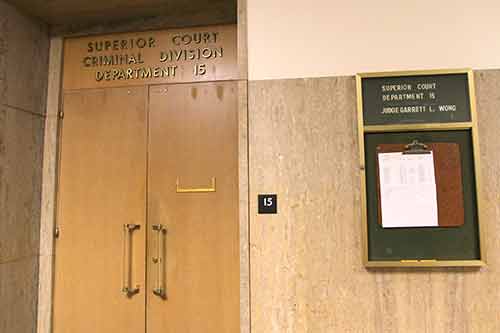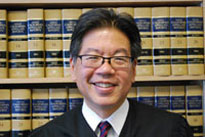
Redemption and rehabilitation took center stage Thursday at Department 15 of the San Francisco Hall of Justice where 27 former felons were officially recognized for graduating from San Francisco’s Behavioral Health Court. (Photography was not permitted inside the courtroom). Photo by David Elliott Lewis.
November 10, 2012
Twenty-seven former felons were officially recognized and celebrated Thursday for redeeming themselves following their graduation from San Francisco’s Behavior Health Court (BHC).

Judge Garrett Wong.
Over 200 people, including friends and family of the graduates – as well as senior staff from the district attorney, public defender and the Adult Probation departments – were packed into Department 15 courtroom at the 1950s-era San Francisco Hall of Justice. Judge Garrett L. Wong presided over the proceedings.
The ceremony was intensely poignant. Some cried. Some laughed. All smiled and applauded. A true sense of hope – a belief that redemption is real – radiated outward.
One client was originally charged with infanticide. Most were charged with felonies. Many faced the prospect of many years of incarceration to be released with a life-destroying stigma of a felony conviction. Now, these individuals have a second chance.
This court represents a disruptive change in the criminal justice system – transforming a primarily punitive system into one that enables people to rehabilitate and redeem themselves.
These 27 men and women graduated from a program that currently serves about 150 and offers two graduations per year. As defendants become clients, they are required to participate in life and job skills training programs – programs managed through a collaborative process of multiple city agencies including the Family Services Agency (FSA), Westside Community Services and Citywide Community Focus.
All had obtained stable housing and employment or enrollment in skills-training programs. Upon graduation, felonies were reduced to misdemeanors and misdemeanors were dismissed. Court imposed fines and fees were waved. With the removal of these criminal penalties, lives were restored.
In pairs, threesomes and sometimes foursomes, clients with their case managers approached the front of the packed courtroom to be greeted by the judge, assistant district attorney and public defender. Their successful participation in rehabilitation and recovery programs was acknowledged. The atmosphere was thick with meaning and anticipation. Emotions ran strong.
In case-after-case, case managers gave specific examples of the successes enjoyed by their clients including finding housing, getting jobs, staying clean, helping to right the wrongs they inflicted, and completing vocational training programs. Many of the clients obtained paying jobs or stipend positions. Some were involved in programs to provide counseling to those who have suffered similar problems. For instance, one earned enrollment in the Peer Specialist Mental Health Certificate Program through the Richmond Area Multi-Services (RAMS) program.
Some spoke English as a second language. One client required a translator. One elicited laughs and affirmations when she said in halting English that she wanted to congratulate herself. Everyone smiled and clapped, recognizing she deserved praise.
Court officials made motions to dismiss or reduce charges. Repeatedly heard was the request, “I am asking that the court terminate the probation as successful.” In response, Susan Belinda Christian of the District Attorneys office would respond, “The people have no objection your honor.” Judge Wong responded, “It is so ordered.” Warm smiles and hearty applause followed. Good feelings swept the courtroom.
Also in attendance included Jennifer Johnson of the Pubic Defenders Office and Julie Roe of the Adult Probation Department. Public Defender Jeff Adachi was also present as well as case managers from Citywide Case Management Forensics and Jail Site and Jail Aftercare Psychiatric Services.
The BHC was created in 2002 in response to a recognition that an increasing number of defendants were suffering from serious mental illnesses. The BHC has been a stimulus and a role model for other courts around the nation. Other states, however, often limit their court admissions to less serious misdemeanor offenders. The San Francisco BHC serves mostly felony level defendants – a far more challenging group to work with.
Not all who are referred to the BHC are accepted. The criteria are strict including a requirement of victim consent. Defendants must be assessed as having an Axis 1 diagnosis – a term applied to those experiencing a serious mental illness but who do not have mental retardation. They must also not exhibit an anti-social personality disorder.
The court is far more strict in allowing admission of those charged with sexual or violent offenses. Some are admitted but only after many other conditions are met. Essentially, the court is designed for those where mental illness was the primary contributing factor behind their crimes. Also, amenability to treatment in the community mental health system is a crucial minimum requirement.
For all those who enter, participation is voluntary and they do not have to enter a plea. For those who are selected, they are truly offered a second chance, a chance to end probation early, eliminate fines and, most importantly, reduce or eliminate criminal charges – charges that would otherwise cause a lifetime of employment and housing discrimination. For these individuals, recovery and redemption become a life saving reality.


 The Hunger Site
The Hunger Site
November 27, 2013 at 5:16 pm
Gratefully, Judge Wong allowed photography in his most recent Behavioral Health Court graduation. You can see my photos here:
https://www.facebook.com/media/set/?set=a.10201836806855536.1073741850.1043606473&type=1&l=ee2bd11f2c
November 10, 2012 at 7:52 pm
I’d like to know whether Mr. Lewis believes that a sociopath can ever be rehabilitated.
February 3, 2013 at 4:59 pm
You are correct, it is very difficult to rehabilitate a sociopath. That is why the court does not admit anyone with Antisocial Personality Disorder, what laypeople refer to as “sociopaths”.
November 10, 2012 at 4:55 pm
I hope someone is gathering follow up data on the graduates so the public can judge the effectiveness of the program. As in how many re-offend and how many other people are injured or killed because of it. The only data I’ve seen is how many diverted and how many $$ saved, but is the program safe and effective for the public at large?